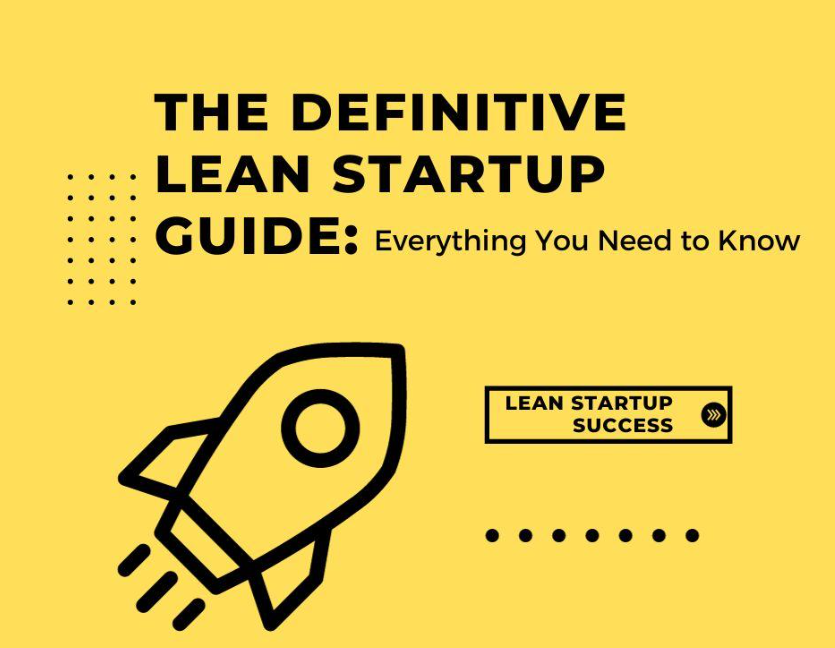The lean startup methodology is revolutionizing the way companies launch and grow. But what exactly makes this new methodology so valuable? Lean startup provides both inspiration and practical tools to make that achievable. So if you’re gearing up for a new venture, take a close look at how this approach can help you maximize your chances of success! While the journey may present challenges, the potential rewards make it all worthwhile. Read on to get the full rundown on maximizing lean principles to build your next business.
Introduction To Lean Start-Up:-
At its core, lean startup is all about taking an experimental approach to creating and managing startups. However, the methodology emphasizes rapid iteration, customer feedback, and eagerly testing ideas to reduce risks and uncertainty.
Thereafter, take a look at the chart below to get more clarity on the major benefits of lean startup methodology.
Some standout lean startup principles include:
Validated Learning:
Rigorously testing hypotheses and getting hard data from real customers to validate if a product or strategy is truly viable. Failures become learnings.
Build-Measure-Learn:
Using feedback loops to build minimum viable products (MVPs). This helps in measuring their real performance and learn from results to improve the next iteration.
Innovation Accounting:
Tracking meaningful startup metrics like customer acquisition cost rather than vanity metrics like total users.
Persevere Or Pivot:
Using validated learnings to determine whether to persevere on the current path or pivot by changing the product, strategy, or even the entire business model.
Thus, following these core concepts allows startups to maximize learning while eliminating wasteful practices that drain resources.
Comparing Traditional And Lean Startup Approaches
This table provides a clear visual comparison between the two approaches, highlighting their key differences.
| Focus | In-depth upfront planning | Rapid experimentation |
| Traditional Business Planning | Lean Startup Methodology | |
| Decisions | Based on projections and assumptions | Based on real customer data |
| Progress | Follow a fixed roadmap | Continually re-evaluate based on feedback |
This comparison table highlights the major contrasts between traditional planning and the lean startup methodology in a visual format.
Harnessing Innovation Accounting For Lean Startup Success
One important lean startup principle is innovation accounting. Unlike traditional accounting, which focuses on financial metrics, innovation accounting uses lean startup methodology. Besides, it helps to track actionable metrics that offer insights into the startup’s progress and customer response.
Some examples of metrics used in innovation accounting include:
- Customer acquisition cost
- Churn rate
- Lifetime customer value
- Active usage metrics
By diligently tracking these metrics, lean startups can gather the data they need to determine whether to persevere on their current path or pivot based on customer feedback. Thus, innovation accounting provides validated learnings that inform smart business decisions. It is opposed to vanity metrics like total customers or sales.
The Lean Process Step-By-Step
While the lean startup methodology is flexible and adaptable, there is a rough process that generally guides its implementation:
Step 1. Identify The Problem
The first step is to take time to clearly identify and articulate the specific customer problem or need that your startup aims to address.
Now, you must ask questions like:
- What underlying frustration or pain point are customers experiencing?
- What needs are going unmet in the market?
- What improvements do customers wish existed?
The issue should be urgent pervasive in the target market. Moreover, they are aligned to a sizable potential customer base. Hence, avoid vague problem statements. Get ultra-clear on the exact problem.
Step 2. Define The Solution
Once the problem is precisely defined, brainstorm potential solutions. Outline an initial product or service concept that could feasibly address that problem in a novel way.
Moreover, think creatively about different approaches, features, and minimum requirements that could satisfy customer needs. At the same time, focus more on figuring out the right broad solution rather than detailed requirements at this stage.
Step 3. Build An MVP
Next, construct a minimum viable product (MVP) to test the solution. The MVP is a prototype that has just enough critical features to validate the core idea and start the learning process. Hence, avoidover-engineering at this stage.
Build the simplest, fastest, most stripped-down representation of the product that enables validated learning. It can be as simple as a landing page description, mockup, or very basic prototype. However, the goal is to waste the least amount of time and resources.
Step 4. Test And Measure
Get the MVP in front of real customers to test assumptions. Approach target users, share the MVP, and collect key data based on how they react and interact with it.
Focus on defining and measuring a small set of actionable metrics that offer insights into customer behavior, needs, and preferences. Example metrics include sign-up rates, clicks, conversions, usage data, etc.
Step 5. Learn And Iterate
With data and feedback collected, analyze results to determine what resonates with customers and what doesn’t. Figure out key learnings, positive signals, and areas for improvement.
Use these learnings to rapidly tweak and tailor the product through iterative changes. Make small refinements and run additional small tests to continue validating the product direction.
Step 6. Scale
Once product-market fit has been achieved based on metrics and feedback, it’s time to scale. Come up with plans for expanding business processes, operations, marketing, and resources to drive growth.
Executing this rapid build-measure-learn loop cost-effectively allows startups to gather data, fail fast, and iterate their way to success faster.
“Companies that prioritize experimentation are 2.5 times more likely to outperform competitors.”
Lean Startup Success Stories
Plenty of today’s hottest startups have leveraged lean methods to skyrocket growth:
- Airbnb: Grew from renting air mattresses in a living room to a $100 billion hospitality disruptor by constantly testing innovations.
- Dropbox: Exploded from 100,000 users to over 4 million in just 15 months thanks to growth hacking experiments.
- Groupon: Pivoted from a collective action platform to become the massively successful daily deals leader.
- Zappos: Originally only sold shoes but iterated into an online customer service powerhouse after recognizing bigger opportunities.
The flexibility of the lean framework lets startups fluidly adapt and uncover breakthrough ideas.
Top Lean Startup Challenges
Adopting lean startup practices comes with hurdles, including:
- Letting go of old habits: Requires shifting away from linear execution plans and embracing experimentation.
- Ambiguity: The constant pivoting and iterating can feel disorganized compared to having a fixed roadmap.
- Need for patience: Repeated rapid testing is meticulous. Results and traction take time.
- Institutional resistance: Established organizations may reject lean approaches that disrupt existing norms.
However, committing to small experiments, tracking meaningful metrics, and iterating products judiciously can help overcome these roadblocks. Adjusting mindsets is essential.
“Over 70% of startups say their corporate culture is not suited for rapid experimentation.”
Tracking Lean Startup Success
Instead of vanity metrics, lean startups should focus on actionable metrics that offer real value:
- Churn rate: The percentage of customers that disengage over time. Lower is better.
- Customer lifetime value: How much revenue each customer generates on average. Want to maximize.
- Cost per acquisition: The amount spent to acquire an average customer. Should decrease.
- Net promoter score: Quantifies customer satisfaction and loyalty. Positive trends are ideal.
Monitoring these unique metrics ensures startups have data-driven insights to guide smart pivots and growth.
Key Takeaways
- Lean startup emphasizes rapid experimentation and customer feedback over detailed upfront planning.
- The core methodology follows a process of identifying problems, defining solutions, building MVPs, testing, and iterating.
- Tracking actionable metrics helps startups make data-driven decisions about pivoting or persevering.
- Well-known startups like Airbnb and Dropbox leveraged lean principles to fuel incredible growth.
- Lean startups fail fast and cheap, learning critical lessons in the process.
- Adopting lean startup practices requires adjusting mindsets away from linear execution plans.
- Patience is key, as measurable traction takes time when running rigorous experiments.
Conclusion
The lean startup methodology offers a modern, nimble approach to launching and growing a successful business. However, by focusing on rapid experimentation over detailed long-term plans, startups can quickly adapt to markets and build products that customers love.
While adopting lean startup practices requires adjusting mindsets, the benefits are game-changing. Instead of huge upfront capital investments, companies can take small risks, learn quickly, and uncover breakthrough innovations.
Dive in to start reaping the many rewards of the lean startup philosophy. The keys to your next game-changing startup await.
Lean Startup FAQs
Let’s go over some common lean startup questions:
How does lean startup differ from traditional business planning?
Traditional plans focus on in-depth upfront research and analysis. But lean emphasizes quick experiments and adapting based on customer responses.
What types of startups is lean startup best suited for?
The methodology can benefit all startups regardless of industry or business model. However, it may offer the most value for highly uncertain, innovative product ideas.
Are there tools that can help adopt lean practices?
There are various low-code tools for building MVPs fast, analytics for tracking key metrics, and more. Lean startup guides like Eric Ries’ book provide foundations.
Read Also:






















